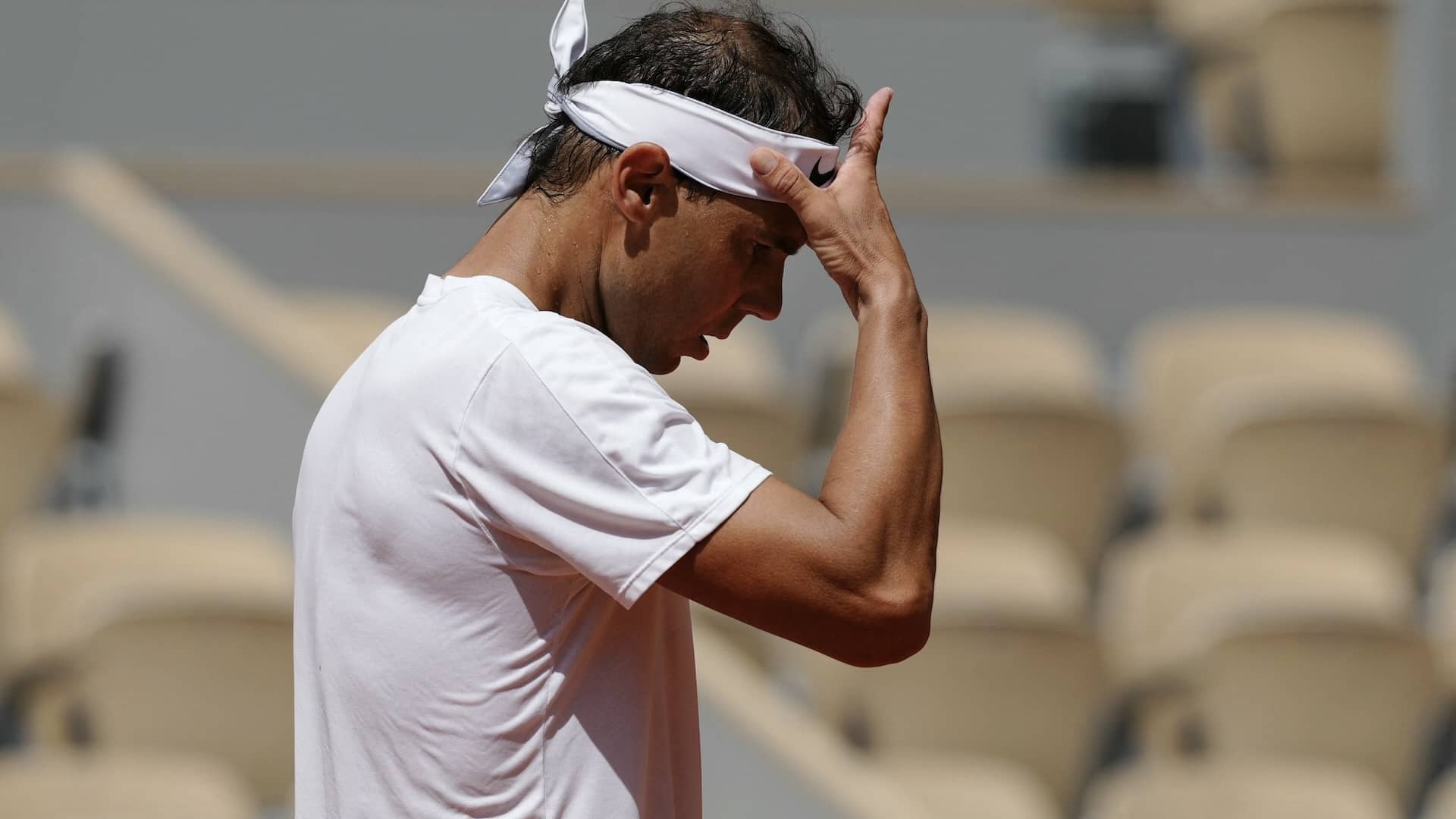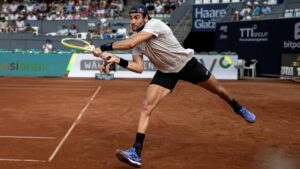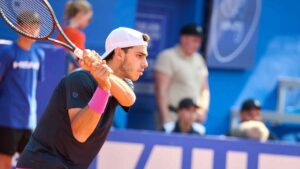
Roland Garros
Moyà and Nadal’s messy puzzle
The Mallorcan coach analyzes how the champion of 22 majors arrives at Roland Garros
May 25, 2024
Dimitar Dilkoff/Getty Images
Rafael Nadal, during training at Roland Garros.
By Rafael Plaza
Before Rafael Nadal’s debut at Roland Garros, Carlos Moyà sits down with ATPTour.com and defends his usual optimism with compelling reasons.
The champion of 22 Grand Slam titles arrives at the tournament of his loves more vulnerable than ever. He has gone through the operating room, then living between hope and relapse, walking a very fine line. He has found himself with one foot outside the elite, the ordeal has been so long, many of the days have been so dark. He has returned with discreet results, as he could not be otherwise after so much time on the canvas. His opponent in the first round is Alexander Zverev, who is fitter than anyone, and there is the recent title in Rome to confirm it.
And yet, it is Nadal.
Hours before the German is measured at his debut in Paris, one of his coaches reveals the depth of the doubts, explains the conscientious plan to reach Roland Garros being competitive and confirms what no one doubted: Nadal is going to breathe his last of life on the clay on which he has built a legend like there will never be another.
How is Rafa?
Getting better. In ascending line. The training level is quite high. Now we need to materialize that in the games. We believe that it is in a position to compete with guarantees.
In Rome he also trained well, but then lost to Hurkacz in the second round.
Not like here. There were more ups and downs there. At times he showed a good level, but with irregularity… Since his return, it was perhaps the first time in which he faced a match with more guarantees [Hurkacz]. She didn’t turn out as we expected. Now, the week she has had of training can help her achieve the level in competition that she always seeks.
So is he training better than ever since his return?
Definitely. In Rome he alternated good training sessions with not so good ones. Everyone here has been positive. They are training sessions, but he hasn’t lost a set so far. I think he arrives at the best time. It was also normal: we come from a long time ago, even further back, at least since I’ve been working with him. It has been a positive evolution. Everything that happened in the past is behind us, at least for now.
Nadal accumulates 13 hours of preparation on the court.
This time it comes from much further back than on other occasions. Therefore, he is training more hours than usual. We have had to speed up the set-up by spending more time on the track. It’s something we don’t like to do, but in the end we have to adapt to what we think Rafa needs. And on this occasion it has been like that.
And with high-level rivals.
It has been like this many times. When we came to Roland Garros, he trained in the days before debuting with Zverev, Tsitsipas… It is true that we have gone from less to more in that aspect as well. First looking for rivals who would give him more rhythm, who would get him in shape without killing him, so to speak. And then, as the week has progressed, we have been more demanding in that aspect as well. All within an evolution. At least, we are seeing him enjoy training, something that hasn’t happened for months.
Were you following the draw for the painting on Friday?
They sent me messages, we weren’t following it.
I understand that it was neither one message nor two.
Some…
It has been very bad luck.
It is clear that he is one of the worst rivals he could face. [Zverev]. He comes very fit and has no problems, neither injuries nor confidence. And he just won in Rome. It’s something that could happen. Assuming that Rafa is not seeded, the draws had been good until now, correct. And this time it was the worst that could happen. We expected a draw that would allow him to gain rhythm and confidence little by little. The circumstances are different. Zverev has touched us and we have to face it in the best way. He is eager, with a very positive attitude. For our part, we know where we are and who we are with. You cling to that. It will be a very tough and disputed match. If Rafa manages to play at the level that he is showing in training… why not think about the best.
If they give you a choice: Zverev in the first round or Zverev in the third round?
As far away as possible. That would mean that Rafa would have won games and that he would arrive with a good track record. I don’t think it’s positive to play with Zverev in the first round, honestly. You don’t have to fool yourself and say things that aren’t true.
What has been the biggest challenge since the operation?
The main challenge was to try to be competitive again. That has been a doubt that Rafa has had since he had surgery. In Brisbane we saw a version that could come close to that. It is true that it was in best-of-three-set matches, and against rivals who were not among the best. There was a good Nadal. Then more problems came, many day-to-day problems that have undermined his morale, leading him to have complicated thoughts.
Can you explain it?
This time it was a puzzle with many pieces out of place. We have had to organize them little by little. We couldn’t train as much as we wanted, having problems with many movements and shots. He has never been freed to be able to play without thinking that he could get hurt or that he was limited. Not being able to train many things, there were quite a few shortcomings. Some pains passed and different ones arrived. Each time it was a new challenge, new pieces out of place.
And now?
Now it seems that for the first time the pieces are starting to fall into place and you can play with peace of mind, with automation that you haven’t had for months. The challenge has been to organize the entire puzzle, which was disordered from top to bottom. We believe that everything is now in place.
Tell me the truth: did you think he was retiring?
Yes, without any doubt. We didn’t know what she would spend in Barcelona. There she had a self-control that he had never seen in her until now. I’m talking especially about the game against Minaur. Rafa was not in a position to compete in an entire match, to go beyond two hours without relapse. We knew that if he wanted to reach Roland Garros he had to go through these situations, controlling the load and efforts. There was no choice but to lift his foot. And he did it. It wasn’t easy in that situation, and in front of a full court. It hurt us all. It was part of the evolution process to reach Paris in conditions. Little by little, he has been having hours on the track, within an ascending line. Seen from afar, and although he has had ups and downs, he has always gone up. We would like him to have had more games in his legs. We thought that in Rome he would show a more competitive version, but we left with the assurance, more or less, that nothing would happen to him in terms of injuries. At that moment you no longer think that it could be the last of his career. But in Barcelona, and at times in Madrid, you do think that it could be the last game he ever played.
He talks about Barcelona and the handbrake. And then in Madrid?
We went day by day. We saw that after the game with Cachín his physique held up. And it was a very fine line between not reaching and not going over. We believed that we had to play that game to test his body under stressful circumstances. That was the decision that was made. We knew it was very difficult to win. Personally, I’m happy with how it went in Madrid. I wouldn’t have liked him to play more than four games. I think then it was Medvedev’s turn… To go far, he had to overcome other matches that in those conditions were not the most advisable. I’m happy with how everything went there.
Have you had many conversations with him these months?
Many.
Is it hard?
Well… It’s very difficult to stop someone as competitive as him. Stop his training hours or stop him in competition, something that had never happened, making him see that Roland Garros was on the horizon. If he wanted to get there he didn’t have to be well in Barcelona or Madrid, he had to add hours and sensations. We are talking about one of the most competitive athletes in history. Stopping him in training or in these types of games… there have been moments when he wanted to continue shooting. He has trusted us a lot in that aspect and we must thank him for the trust that he has given us to limit the hours and the loads. I think we were right, honestly. We are missing a couple of games, but we are where we thought he could be.
It’s Nadal and it’s Roland Garros. Is he coming to win the tournament or do you think it’s enough for him to play an acceptable role?
There is no longer any brake. Rafa is going to die, going 100%, giving everything. We enter a new situation: five-set matches. He hasn’t had that experience for two years, but we believe he is ready. There is no more risk than in Brisbane or any other tournament. If something happens to him, it is not because he lacks training or games. It must have been an overexertion that his body could not withstand, but we have guarantees that nothing should happen.
Source: https://www.atptour.com/es/news/roland-garros-2024-moya-entrevista-sabado


